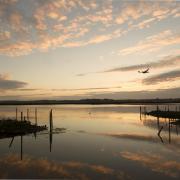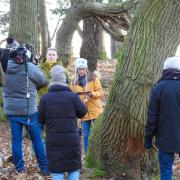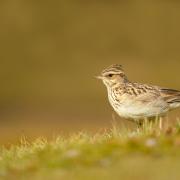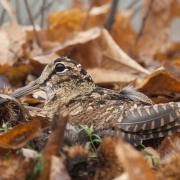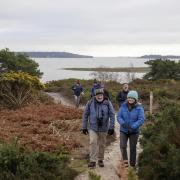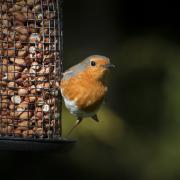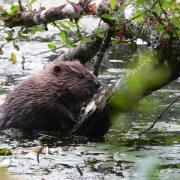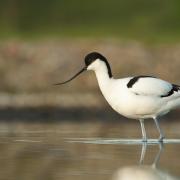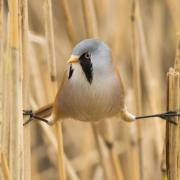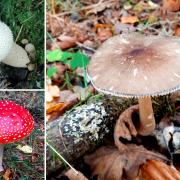Hiding in the eelgrass meadows of Studland Bay and lurking in rocky areas of Poole Harbour are delicate sea monsters that need our help, says Sally Welbourn
The seahorse is unlike anything else seen in nature; with their horse-like head, long snout and prehensile tail, they look like an exotic and mystical creature. And they can be found in the coastal waters around Dorset.
Both the short-snouted seahorse (Hippocampus hippocampus) and the spiny seahorse (Hippocampus guttulatus) are native to Dorset. Dorset Wildlife Trust’s Marine Conservation Officer, Emma Rance, encountered two spiny seahorses whilst out on a dive: “Meeting a seahorse is just the most wonderful experience,” she enthuses. “They looked so relaxed and peaceful. It’s made me feel very protective of them – they are such delicate creatures and are very hard to see. It was by far the best dive I’ve ever done.”
As with many species of marine wildlife, seahorses face multiple threats. However, well-managed and extensive marine habitats can make all the difference to the survival of these legally protected creatures.
While the short-snouted seahorse is found in rocky and gravelly areas, the spiny seahorse is more likely to be found in underwater meadows, hiding in seagrass. One area with a known seahorse population is Studland Bay, and this is an area Dorset Wildlife Trust (DWT) is recommending to be designated as a Marine Conservation Zone (MCZ).
“We would like to see an MCZ at Studland Bay,” says Emma. “This would not only protect the marine environment, but can benefit all stakeholders, including the boating community. The area is also important for the young of fish species such as pollack and bass, so an MCZ designation could help protect fish nursery areas which ultimately will benefit the local fishing industry.”
Seahorses are shy and elusive creatures, so populations can be hard to measure. Without long-term data to draw on it’s sometimes difficult to say how well seahorse populations are doing locally. However there is some good news as there have been recent reports of fishermen in Poole Bay catching numbers of short-snouted seahorses in their nets - all are returned alive.
Dorset Wildlife Trust has launched the Marine Conservation Fund, which specifically focuses on protecting our unseen marine world. The seahorse is just one of the marine species the fund aims to help, as Emma explains: “We want to find out more about seahorses and the habitat they live in. We’re hoping that the Marine Conservation Fund will allow us to invest in equipment such as underwater cameras. These could be used to do transects of the site and record the natural behaviour of the seahorse, which is sometimes difficult for divers to record.”
To find out more and donate to the Marine Conservation Fund, please visit the DWT website dorsetwildlifetrust.org.uk/dmcf.
5 seahorse facts
1. Who’s the daddy? The female seahorse transfers eggs to the male’s pouch, where they hatch and develop. The male then gives birth to tiny replica seahorses. The male even has birth contractions!
2. Masters of deception: Seahorses can turn their back to predators to make themselves look thinner – this is thought to help with their camouflage in the wild.
3. A little monster: Their scientific name hippocampus comes from the Ancient Greek word hippos meaning ‘horse’ and kampos meaning ‘sea monster’ or kampe meaning caterpillar.
4. Record breaking: The largest seahorse ever found was in Poole Harbour in 2015. Reported as measuring a massive 34cm long, the spiny seahorse was discovered by an angler fishing for mullet in Poole Harbour. It was released back into the sea unharmed.
5. Legally protected: Under the 1981 Wildlife and Countryside Act, it is illegal to intentionally harm, disturb or kill a seahorse.
For more information on Studland Bay and Dorset Wildlife Trust’s vision for people and nature at Studland Bay please visit dorsetwildlifetrust.org.uk/studlandbay.
Adopt a seahorse
As part of the Marine Conservation Fund, DWT has launched a Seahorse Adoption scheme. For a one-off donation of £20 you’ll get a cuddly seahorse toy, regular updates on their work and a fact sheet. DWT is also giving away a free Seashore Wildlife Guide for the first 10 people who adopt a seahorse.
To register for your pack please call Jodi Hibbard on 01305 264620 or visit dorsetwildlifetrust.org.uk.




